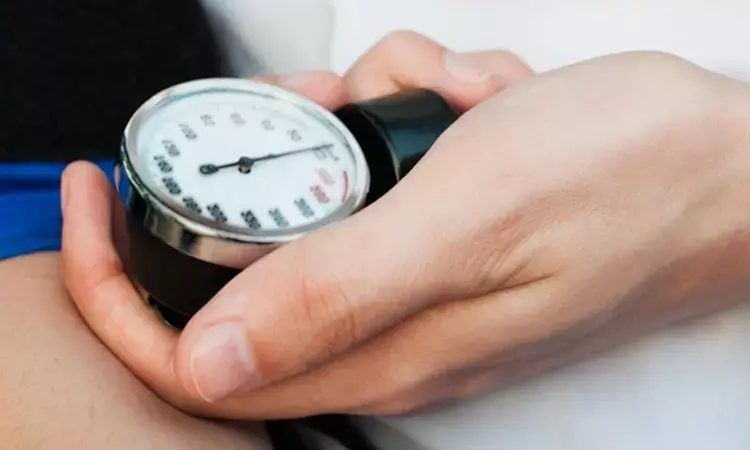- Home
- Medical news & Guidelines
- Anesthesiology
- Cardiology and CTVS
- Critical Care
- Dentistry
- Dermatology
- Diabetes and Endocrinology
- ENT
- Gastroenterology
- Medicine
- Nephrology
- Neurology
- Obstretics-Gynaecology
- Oncology
- Ophthalmology
- Orthopaedics
- Pediatrics-Neonatology
- Psychiatry
- Pulmonology
- Radiology
- Surgery
- Urology
- Laboratory Medicine
- Diet
- Nursing
- Paramedical
- Physiotherapy
- Health news
- Fact Check
- Bone Health Fact Check
- Brain Health Fact Check
- Cancer Related Fact Check
- Child Care Fact Check
- Dental and oral health fact check
- Diabetes and metabolic health fact check
- Diet and Nutrition Fact Check
- Eye and ENT Care Fact Check
- Fitness fact check
- Gut health fact check
- Heart health fact check
- Kidney health fact check
- Medical education fact check
- Men's health fact check
- Respiratory fact check
- Skin and hair care fact check
- Vaccine and Immunization fact check
- Women's health fact check
- AYUSH
- State News
- Andaman and Nicobar Islands
- Andhra Pradesh
- Arunachal Pradesh
- Assam
- Bihar
- Chandigarh
- Chattisgarh
- Dadra and Nagar Haveli
- Daman and Diu
- Delhi
- Goa
- Gujarat
- Haryana
- Himachal Pradesh
- Jammu & Kashmir
- Jharkhand
- Karnataka
- Kerala
- Ladakh
- Lakshadweep
- Madhya Pradesh
- Maharashtra
- Manipur
- Meghalaya
- Mizoram
- Nagaland
- Odisha
- Puducherry
- Punjab
- Rajasthan
- Sikkim
- Tamil Nadu
- Telangana
- Tripura
- Uttar Pradesh
- Uttrakhand
- West Bengal
- Medical Education
- Industry
Low prestroke BP associated with increased death risk following stroke event, finds study

Boston - While high blood pressure or hypertension has been a well-established risk factor for stroke and for deaths, it turns out that having low blood pressure is just as great a risk factor for death after stroke.
Lower average blood pressure, measured in the outpatient setting, was associated with increased risk of death after a stroke event, finds a new study. Low prestroke BP was associated with mortality after stroke, particularly among patients with at least one comorbidity.
Current national guidelines recommend treating high blood pressure after stroke, but the timing of this treatment and whether to treat patients in a normal, low or mildly elevated range of blood pressures has been debated.
The researchers identified nearly 30,000 Veteran patients with a first ischemic stroke who had outpatient blood pressure measurements within the previous 18 months prior to stroke. They divided this group by blood pressure categories and followed them over time for the outcomes of all-cause and cardiovascular mortality, with the hypothesis that both very high and very low blood pressure values contribute to higher mortality risk. They found that persons with lower blood pressure had the highest mortality, especially when they looked at a subgroup of patients with at least one comorbidity of smoking, cardiovascular disease, cancer or dementia. "Our study suggests that stroke patients with history of low to low-normal blood pressures, some 10 percent of stroke patients, are at high risk of mortality," said Aparicio.
The researchers hope that by investigating the factors that contribute to death after stroke, patients, families and practitioners can better understand and recognize conditions, like low blood pressure, that may predict their health outcomes. "Ideally, this information can encourage better prevention, diagnosis, and treatment of risk factors such as smoking, heart disease, and cancer, so that if a stroke does occur patients have a better chance at recovery and survival," he added.
"Lower average blood pressure, measured in the outpatient setting, was associated with increased risk of death after a stroke event. In addition, this higher risk of death appeared to happen particularly in patients who were smokers, or had a diagnosis of cardiac disease, cancer or dementia," explained corresponding author Hugo J. Aparicio, MD, MPH, assistant professor of neurology at Boston University School of Medicine and an investigator at the Framingham Heart Study.
https://www.ahajournals.org/doi/10.1161/STROKEAHA.120.033195
Meghna A Singhania is the founder and Editor-in-Chief at Medical Dialogues. An Economics graduate from Delhi University and a post graduate from London School of Economics and Political Science, her key research interest lies in health economics, and policy making in health and medical sector in the country. She is a member of the Association of Healthcare Journalists. She can be contacted at meghna@medicaldialogues.in. Contact no. 011-43720751
Dr Kamal Kant Kohli-MBBS, DTCD- a chest specialist with more than 30 years of practice and a flair for writing clinical articles, Dr Kamal Kant Kohli joined Medical Dialogues as a Chief Editor of Medical News. Besides writing articles, as an editor, he proofreads and verifies all the medical content published on Medical Dialogues including those coming from journals, studies,medical conferences,guidelines etc. Email: drkohli@medicaldialogues.in. Contact no. 011-43720751


